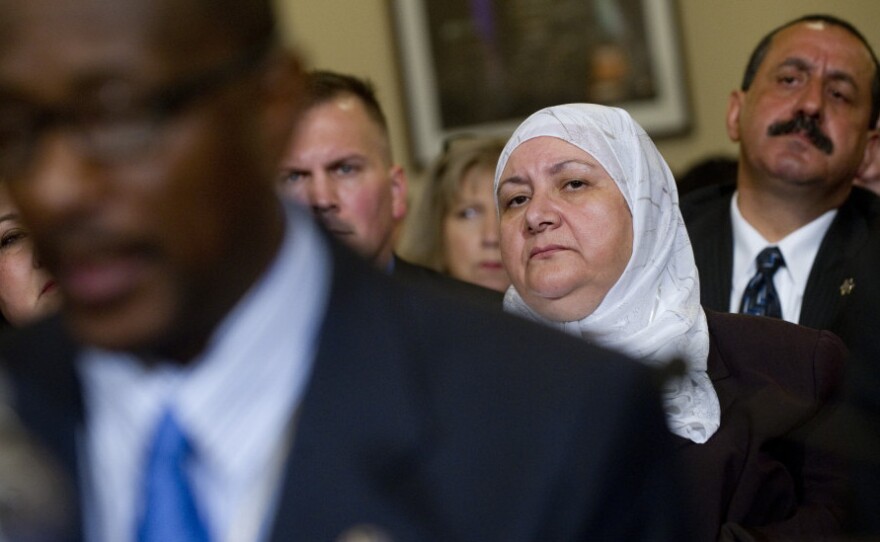Maybe it was the tearful opening testimony of Rep. Keith Ellison, a Minnesota Democrat who in 2006 became the first Muslim elected to Congress.
Or it may have been wariness after weeks of partisan tumult that preceded Thursday's House Homeland Security Committee hearing on Muslim radicalization.
Whatever the reason, Thursday's much ballyhooed event drew a crush of media and onlookers, but provided little fresh information and not much drama — outside of Ellison's emotional remembrance of a Muslim American first responder who died on Sept. 11.
"He wanted to be seen as an all-American kid," Ellison said, through tears, before shielding his face with paper copies of his speech.
Throughout the more than four hours of testimony from witnesses, including the Los Angeles county sheriff and a Minneapolis Muslim whose nephew was killed after being recruited by Somali radicals, most members chose their words carefully. The subject — whether to focus "homegrown terrorism" hearings exclusively on Muslims and their communities — has bitterly divided lawmakers.
On Thursday, the tone was largely respectful, but still, there were moments of contention. Democrats sharply questioned not only whether the hearings were designed to "demonize" Muslim Americans but also whether the witnesses' personal stories amounted to more than mere anecdotes.
And Republicans were highly critical of large Muslim-rights organizations, charging they have failed to help Muslims concerned about radicalization in their communities.
Hysteria Or Legitimate Concern?
But during a press conference at the hearing's close, Committee Chairman Peter King, a New York Republican, said he would "challenge anyone to find something improper today."
And he berated the media for what he characterized as promoting "mindless hysteria" in the days leading up to the hearing.
Michigan Rep. Hansen Clarke, a Democrat whose father was Muslim, said he believes that concerns raised before the hearing "may have made questions here today more tempered and balanced."
"Thousands of innocent people have been killed because of terrorism, so emotion and outrage is understandable," said Clarke, as he emerged from the Cannon House Office Building meeting room.
"But in our effort to battle terrorism, we must base our decision on this panel on reliable intelligence," he said. "Religion — faith and God — is not the issue."
During the hearing, a group of religious leaders holding a press conference on another floor criticized the singling out of the Muslim community, asserting it would exacerbate "Islamophobia."
"As I sat in the hearing room," said Rabbi Marc Schneier, "I was witness to an injustice."
Covering Familiar Ground
The Senate Homeland Security Committee has already held 14 hearings on radicalization over the past several years. Much of Thursday's hearing covered similar and — in the case of the Somali recruit — exactly the same ground.
King has promised more hearings over the next 18 months, with the next likely to look at radicalization of Muslims in American prisons.
What emerged from King's first radicalization hearing appeared not so much an attack on the Muslim community's role in battling homegrown terrorism, but a sustained two-pronged attack: on "political correctness" and on the Council on American-Islamic Relations, an influential Muslim-rights advocacy group.
Republican Rep. Michael McCaul of Texas suggested it was "political correctness" that kept authorities from taking action to remove Army Maj. Nidal Hasan, a Muslim American who is accused of murdering 13 people at Fort Hood in 2009.
Hasan is alleged to have called himself a "soldier of Allah" on his business cards.
A Debate Over CAIR
In a tense exchange with Los Angeles County Sheriff Leroy Baca, who was invited by Democrats, freshman Minnesota Republican Rep. Chip Cravaack referred to CAIR as "a terrorist organization" that may be using the sheriff.
Baca said Cravaack's question sounded more like an accusation, and replied: "We don't play around with criminals in my world. If CAIR is an organization that's a, quote, criminal organization, prosecute them, hold them accountable, and bring them to trial."
The U.S. Department of Justice last year confirmed that CAIR was among nearly 250 individuals and organizations named as unindicted co-conspirators in a case against a Texas-based Muslim charity accused of funneling money to the Palestinian extremist group Hamas.
King took more swings at the organization, which has chapters in 30 cities in nine states, saying it has failed to help those in the Muslim community — including those in the Minneapolis Somali community — who are attempting to root out radicalism.
Ibrahim Hooper, CAIR's communications director, characterized King's assertions as "old news that the right wing continually brings up to smear us, and to smear the Muslim community." CAIR has argued that its dealings with Hamas predated, for the most part, that group's designation as a terrorist organization.
"What we see happening here is that Rep. King, unable to back up his false smears about Muslims, is left with attacking the big organization," Hooper says. "That's life in the big city, and what we expected from him."
Copyright 2022 NPR. To see more, visit https://www.npr.org. 9(MDAzMjM2NDYzMDEyMzc1Njk5NjAxNzY3OQ001))







